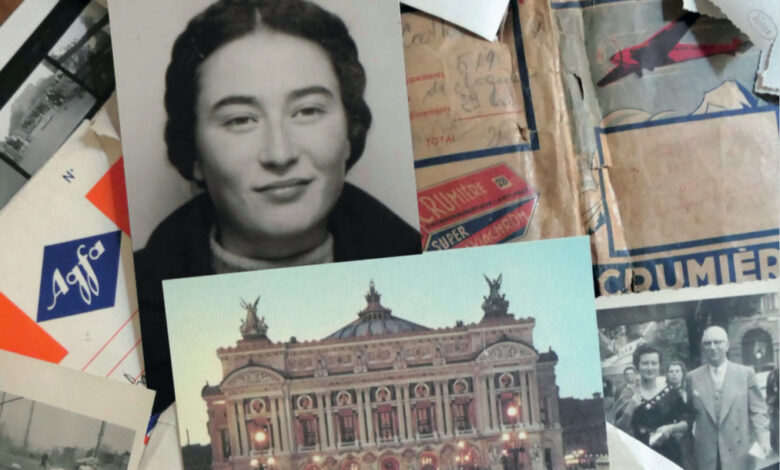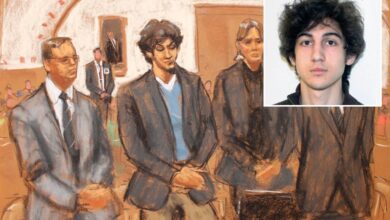The mysterious postcard that revealed family ties from the Holocaust

French author Anne Berest didn’t know much about the Jewish side of her family apart from the fact that her grandmother had lost her parents and siblings to the Holocaust.
Then, in 2003, an anonymous postcard arrived at her mother’s house in Paris.
On the front: a photo of the Opéra Garnier. On the back: the names Ephraïm, Emma, Noémie and Jacques — Berest’s four family members killed in Auschwitz.
“We were terrified,” Berest tells The Post, speaking partially through a translator during a recent visit to New York City.
The Opéra was the chief hangout of the Nazis when they occupied Paris during World War II, she explained.
“For us French people, that’s a very strong symbol,” she says, adding that a recent surge in antisemitism and xenophobia in Europe added a layer of menace to the card.
“All the signs on the postcard were signs of a threat.”
That mysterious note led Berest on a quest to discover who sent the postcard — and why.
What she found inspired her stunning book, “The Postcard” (recently published in the US by Europa Editions, with a translation by Tina Kover).
“The Postcard” — which caused a sensation in France when it was published in 2021 — has the thrills of a crime novel, as Berest enlists the help of her chain-smoking mother, a private detective, a graphologist and even her great-grandparents’ former neighbors to find the postcard’s sender.
But it’s also a grand multigenerational family saga.
In the course of her investigation, Berest uncovers the amazing story of her grandmother Myriam Picabia, who not only evaded the Nazis but also worked in the Resistance.
“I’d always seen my grandmother as an old lady,” Berest says.
Working on the book, “I discovered this sort of vitality, this sort of lust for life [in her].”
Berest did not know she was Jewish until she was 8 or 9 years old, when she had to do a family tree at school. It was then that her mother explained that they were Jewish and that Berest’s great-grandparents had died in Auschwitz.
“All conversations surrounding the Holocaust were very short,” Berest remembers.
“So it was up to me, as a child, to fill in the gaps.”
Berest began her investigation by looking into her grandmother’s life.
Myriam Rabinovitch — later Picabia — was born 1919, in Moscow, the daughter of Ephraïm, an engineer, and Emma, a piano teacher.
“All conversations surrounding the Holocaust were very short. So it was up to me, as a child, to fill in the gaps.”
Anne Berest
Her family fled Russia after the Revolution in a covered wagon, spent time in a Latvian jail and harvested oranges in Palestine before arriving in France.
Ephraïm refused to believe that the French would betray them.
Even when they surrendered to the Nazis, he stubbornly stayed in his adopted country.
Myriam — a philosophy student at Le Sorbonne — had married Vicente Picabia, son of the Cubist artist Francis Picabia, but was visiting her parents’ farmhouse outside of Paris the day the police came to take away her two teenage siblings, Noémie and Jacques.
Ephraïm told Myriam to run and hide in the grass and she stayed there all night, bicycling back to Paris at dawn.
Vicente’s mother Gabriële was in the Resistance and smuggled Myriam in a hidden compartment of her car 50 miles north of Marseilles, where she and her husband would also join the Resistance, running messages and translating illicit BBC broadcasts.
“I had no idea [Myriam was in the Resistance],” Berest says.
She also discovered that Myriam was involved in a menage a trois with Vicente and another man hiding out in the same farmhouse during the war. (She later married him after Vicente committed suicide shortly after the war.)
“This is actually part of the book that my mother didn’t didn’t really want me to write,” Berest says.
“But this sort of love triangle, this three-person romantic arrangement, was one of the most striking things for me . . . After writing so many difficult pages about dark, dark times, [this romance] was a kind of light in the book.”
After the war, Myriam went back to Paris.
She later learned that her parents and siblings had all died in Auschwitz. She never got over the guilt. She never spoke of the war, or her Resistance activities, to her children or grandchildren.
That wasn’t uncommon, particularly for Jews who had survived the war in France, because “even after the war, your neighbors were people who had denounced members of your family and they were still there in the building,” Berest says.
“Even the policeman who had arrested those Jews were still working. It’s part of the reason why there’s such a big silence from the Jewish community even in the aftermath of the war in France.”
Myriam, she adds, “was always sort of between two worlds, the world of the present and the world of before the war — a world that was entirely destroyed, that she couldn’t share with anyone.”
Berest did not intend to write a book about the postcard and the secrets it unearthed.
“I realized one day that I had all the elements of detective fiction, so I started to take notes,” she says. She said that at some points she feared for her life — such as the time they went to her great-grandparents’ village and discovered Emma’s old piano, pillaged from their home, at the house of a former neighbor.
But mostly, she was worried she would never find the sender.
“In the book, my search takes around four months, but in reality, it took around four years,” she says.
“And I was desperate . . . Since what I was recounting in the novel was real, I didn’t want to invent an ending. I was telling myself if I don’t find an end to this book, my readers are going to be furious. They’re going to want a refund!”
Berest did solve her mystery — it’s truly surprising, both less dramatic but also stranger than fiction.
Yet the biggest revelation in “The Postcard” is not the sender, but what Berest learned about herself in the process.
“I knew I was Jewish, but I didn’t know why,” she says.
“So this book, in a way, is sort of a way to force myself to answer this question: What does it mean for me to be Jewish?”
Now, when people ask her if she’s Jewish, Berest can say, with complete confidence: “Yes.”
Get Best News and Web Services here







